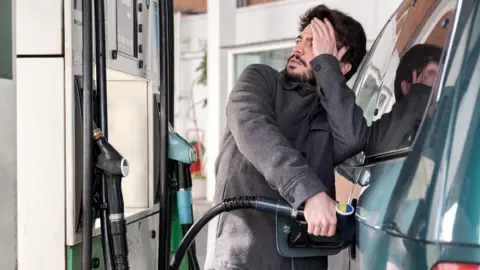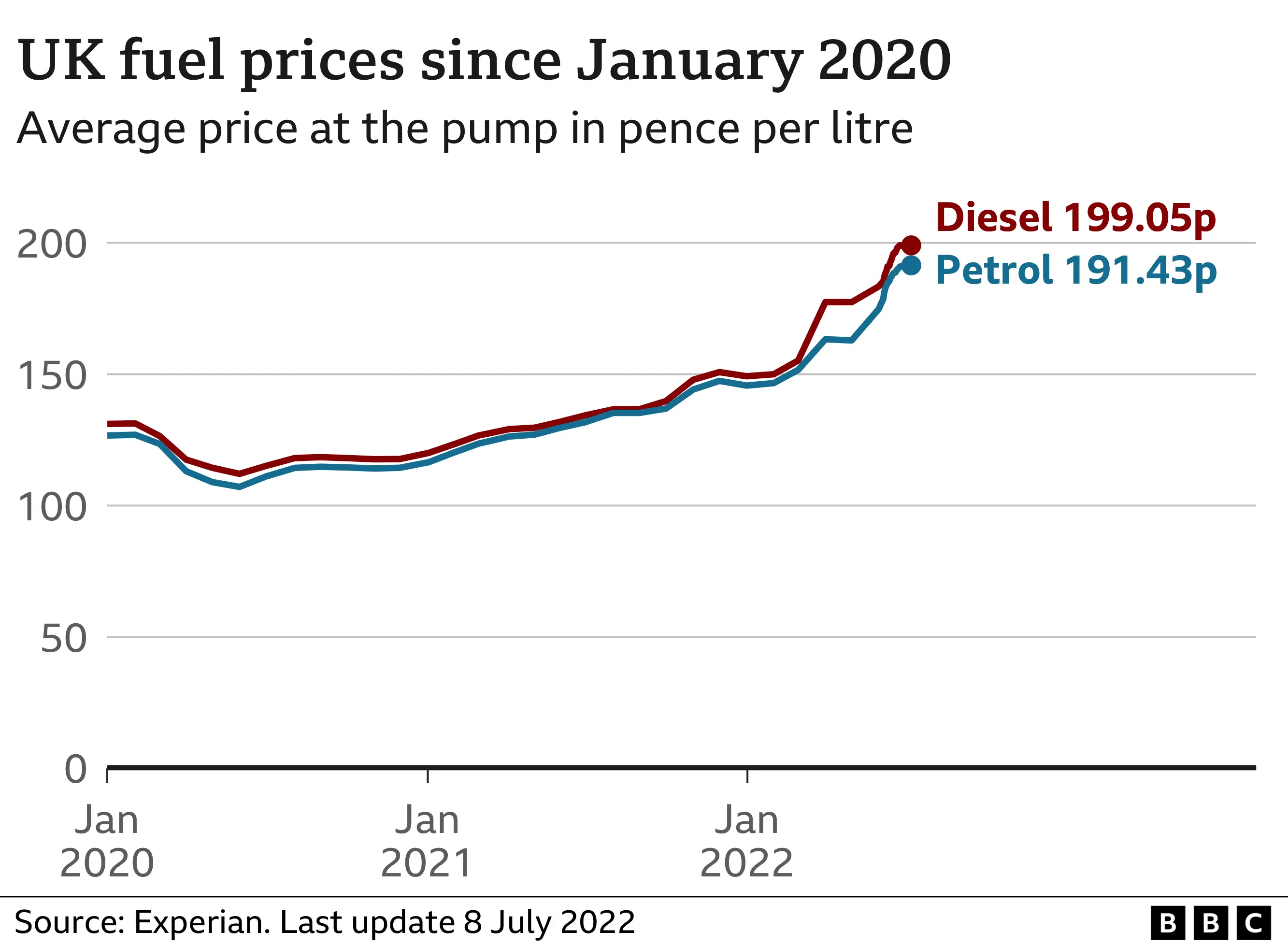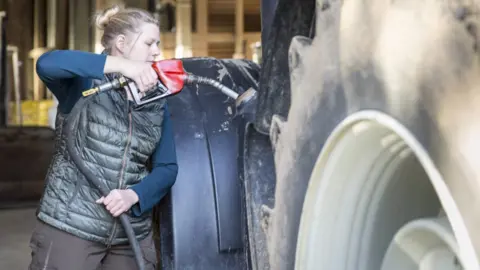Petrol pricing is cause for concern, warns watchdog
 Getty Images
Getty ImagesPetrol and diesel pricing will be investigated by the UK's competition watchdog after it found "cause for concern in some parts" of the industry.
The Competition and Markets Authority (CMA) said it had discovered a sharp rise in prices once fuel had been processed by oil refineries.
It also found "significant differences in price" between forecourts in "many rural and urban areas".
However, it said retailers had passed on a 5p fuel duty cut to motorists.
The initial review of the market by the CMA was requested by Business Secretary Kwasi Kwarteng last month over concerns that retailers and forecourts were failing to implement the cut for consumers.
The CMA's initial review found that "on the whole the fuel duty cut appears to have been implemented".
However, the competition body will now immediately begin an in-depth study of the market amid record fuel prices.
While oil prices are elevated due to Russia's assault on Ukraine, Brent crude - the international benchmark - is currently $104 a barrel, far below this year's peak of $128 reached in early March.
But petrol and diesel prices remain at a record high, fuelling the cost of living which is rising at the sharpest pace for 40 years.
The average price for a litre of petrol is now 191.43p, according to the RAC motoring association, taking the cost of filling an average sized 55-litre family car to £105.29. Average diesel prices have reached 199.05p a litre.

The CMA said a main driver of rises was the growing gap between the price of crude oil before it goes into a processing plant compared to the price once oil refineries have processed it into petrol and diesel.
The difference between crude oil and the wholesale price of petrol and diesel had tripled in the past year from 10p to nearly 35p per litre. The CMA said the increase accounts for over 40% - or 24p per litre - of the rise in fuel prices over the past year.
Oil refiners turn crude oil into diesel, petrol and other products.
"While there is no escaping the global pressures pushing up fuel prices, the growing gap between the oil price, and the wholesale price of petrol and diesel, is a cause for concern," said Sarah Cardell, general counsel at the CMA.
"We now need to get to the bottom of whether there are legitimate reasons for this and, if not, what action can be taken to address it."
She added: "On the whole the retail market does seem to be competitive, but there are some areas that warrant further investigation. These include finding out whether the disparities in price between urban and rural areas are justified."

Analysis:
By Caroline Davies, BBC business correspondent
Fuel prices are at record highs, but are some parts of the market making it worse?
The CMA was originally asked to see if retailers significantly added to the problem. The answer from today's report is mostly it doesn't think so - the fuel duty cut the government implemented has been passed on, for instance - although the CMA is going to dig in further.
Now it is looking a bit higher up the chain to see if oil refineries are causing a problem; is the big difference between the amount they pay for crude oil and the amount they sell it for wholesale legitimate?
The CMA has suggested some measures like requiring petrol stations to share data on current prices to help transparency and costs now.
While there's an appreciation by groups like the RAC that thorough and fair reports take time, there's also frustration too. A review following a review is not necessarily what drivers who are feeling the pinch now want.

The AA's Jack Cousens said that while the motoring association welcomed the probe into road fuel pricing it felt that the problem "is not the gap between the oil price and wholesale price feeding through to the forecourts but the length of time it takes for that wholesale price to be reflected at the pump".
"The fuel trade has no trouble in passing on rising costs to the customer but lags badly in passing on savings. It has been labelled 'rocket and feather' pricing, and it exists."
But the CMA said that its review found that the difference between wholesale petrol and diesel prices and what forecourts charge for fuel "has not been a significant contributor to the overall rise in pump prices".
Gordon Balmer, executive director of the Petrol Retailers Association said: "In recent months, we have seen motoring organisations and politicians attempting to scapegoat petrol retailers.
"This report exonerates petrol retailers and leaves unanswered questions about the extent to which these critics understand the retail fuel market at all."
Price differences
In its initial review, the CMA found that "motorists face higher prices in some parts of the UK than in others". It said fuel price competition usually takes place at a local level, meaning that retailers will set prices based on what local rivals are charging, "and work to the benefit of motorists".
If there are few competitors in one area, then drivers could end up paying more for their fuel.
The CMA said: "A competitive retail fuel market can be particularly important to rural communities, which tend to be more reliant on cars as a means of transport."
It said rural areas pay on average 1p-2p per litre more for road fuel: "Although in some areas the difference will be substantially more."
 Getty Images
Getty ImagesAlthough the CMA found that on the whole retailers appear to have passed on the 5p cut in fuel duty, some MPs are calling for an additional tax cut.
Motorists pay both fuel duty and 20% VAT on petrol and diesel.
"Urgent action needs to be taken," Conservative MP Robert Halfon told the BBC. "The government needs to slash either VAT or fuel duty and to ensure that that cut is passed on to motorists at the pump.
"So not only do we need to cut taxes because motorists are being fleeced by the government and by the oil companies, they need to make sure there is a pump watch, a regulator so there is fair competition at the pumps, so that any tax cut is passed through to the motorist."
Tax will be a key issue among those competing to replace Prime Minister Boris Johnson as leader of the Conservative party after he resigned on Thursday.
But it is expected to take some weeks to find his replacement and it is not clear if key policy decisions, such a tax cuts, will be made during this period.